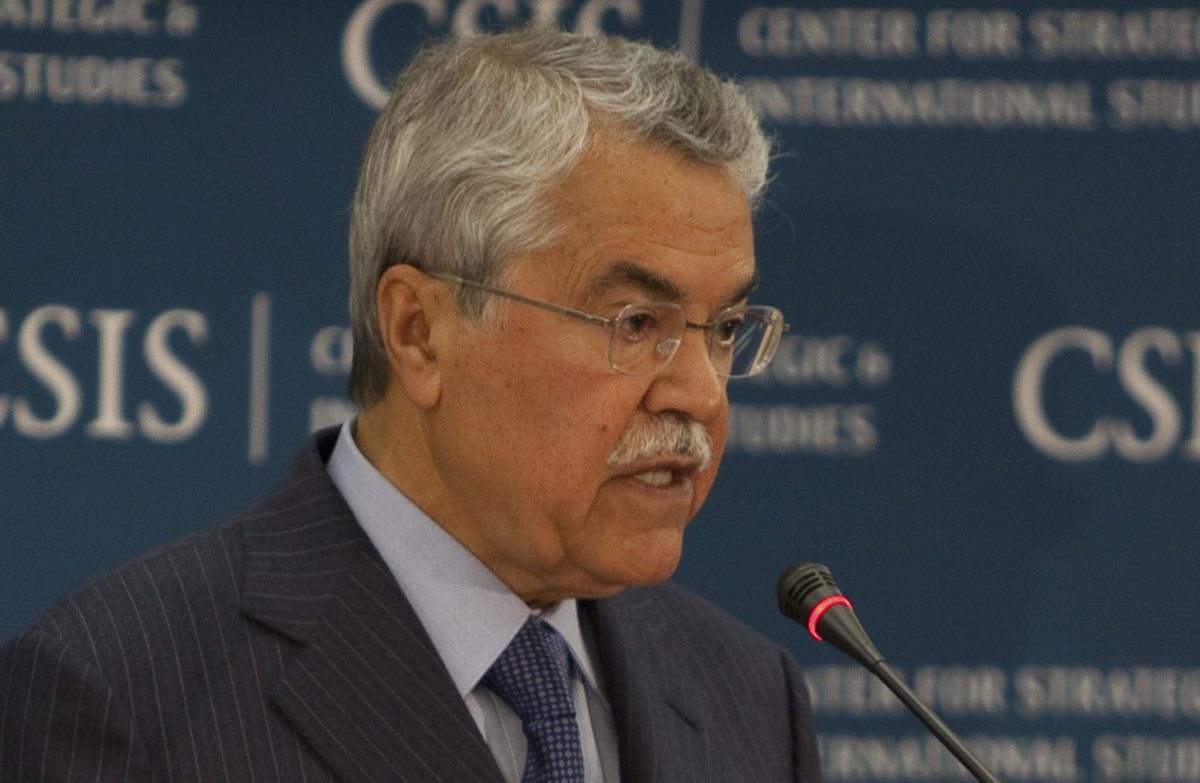Firms in Fed’s Beige Book Fret Over Any Lengthy Baltimore Port Closure
(Bloomberg) — The closure of one of the East Coast’s busiest ports after the collapse of Baltimore’s Francis Scott Key Bridge has so far not led to broad price increases,...


Image (c) R.Almeida/gCaptain.com
At the Center for Strategic and International Studies (CSIS) this morning, His Excellency Ali I. Al-Naimi, Minister of Petroleum and Mineral Resources for the Kingdom of Saudi Arabia discussed his views on the dynamic changes taking place on the global energy scene, and in particular, discussed his view on the energy “renaissance” currently underway in the United States.
By all accounts, Minister Al-Naimi came across this morning as a supporter of the current oil and gas revolution in the United States, one that is changing the dynamics of Saudi Arabian global oil trade.
“The US energy scene is witnessing a remarkable transformation,” he noted. “I welcome these new supplies into the global oil market,” supplies which he believes will bring increased stability and increased U.S. engagement within the global energy markets.
There’s been a lot of talk about the end of the United States’ reliance of foreign, and in particular Middle Eastern oil. Many oil companies predict the United States will surpass Saudi Arabia in oil production in the next few years.
He comments that Middle East oil exports to the U.S. from Saudi Arabia were higher in 2012 than at any time since US tight oil production began in 2009. “The United States is, and will remain, a major energy consumer. It will continue to meet domestic demand by utilizing a variety of sources, including from the middle east. This is simply sound economics,” commented Al-Naimi.
Secondly, Minister Al-Naimi believes that talk about energy independence on foreign oil is “naive and overly simplistic” and that it fails to recognize how interconnected the world’s energy markets are.
“If you take crude and all liquid products together, the US is currently the third largest exporter behind Saudi Arabia and Russia. We’re all part of a global market and no country is truly energy independent.”
Increasing US production does not mean the US could, or should detach itself from international affairs.
I don’t believe that is in anyone’s best interest, and I don’t think it will happen. The question is not how will the US achieve energy independence, but to what degree it will and be prepared to export its oil and gas supplies?”
Current Outlook in Saudi Arabia
Minister Al-Naimi comments that Saudi Arabia’s main mission right now is to continue to diversify their GDP away from oil revenues, and it appears they have been quite successful at meeting that goal.
“In 1973 the contribution of oil to Saudi Arabia’s GDP was 65 percent, last year it was under 30 percent,” notes Al-Naimi.
Saudi Arabia is actively pursuing investments in new mineral industries and renewable sources like solar. Other investments include a huge investment in people, schools, and universities. In fact, 10% of Saudi Arabia’s budget is spent on higher education and the King Abdullah scholarship program sponsors around 150,000 students worldwide to gain qualifications. Nearly half of their university students enrolled in American classroom.
“This will have a huge impact,” notes Al-Naimi, “and underlines how important the two countries are to one another.”
No plans to go up to 15 million barrels per day
While Saudi Arabia currently idles at around 9 million barrels per day, and VLCCs continue to be underutilized around the world, Prince Turki Al-Faisal mentioned in a speech at Harvard this week that Saudi Arabia had plans to achieve 15 million barrels per day of production,. Minister Al-Naimi commented today that the Kingdom has no plans to achieve production rates that high.
“We don’t see anything like that even at 2030 or 2040.” Al-Naimi notes. “The need to build facilities or drill wells to hit 15 million is not there. We will be lucky to go past 9 million barrels by 2020. There is no call to go past 11 or 11.5 by 2030 or 2040 based on any projections that I’ve seen.”
Bio:
His Excellency Minister Ali Ibrahim Al-Naimi has been Minister of Petroleum and Mineral Resources for the kingdom of Saudi Arabia since August 1995. Prior to being appointed Minister, he had served as chief executive officer of Saudi Aramco for seven years. Minister Naimi has spent his career in energy exploration and production, beginning in 1947 as a foreman with Saudi Aramco, and progressing through the ranks as an assistant superintendent, superintendent and manager, before moving into the Exploration Department in 1953. He was appointed vice president of Aramco in 1975, senior vice president in 1978 and was elected as an Aramco director in 1980. He became executive vice president of Operations for Aramco in 1982, and then company president in 1984. He was named as the chief executive officer for Aramco in 1988.
Minister Al-Naimi studied at the International College and the American University in Beirut, Lebanon, from 1956 until 1963. He earned his B.Sc. in Geology from Lehigh University in Pennsylvania in 1962 and a master’s degree in Geology from Stanford University in 1963.
Join the gCaptain Club for curated content, insider opinions, and vibrant community discussions.


Join the 105,961 members that receive our newsletter.
Have a news tip? Let us know.
Access exclusive insights, engage in vibrant discussions, and gain perspectives from our CEO.
Sign Up




Maritime and offshore news trusted by our 105,961 members delivered daily straight to your inbox.



Essential news coupled with the finest maritime content sourced from across the globe.
Sign Up